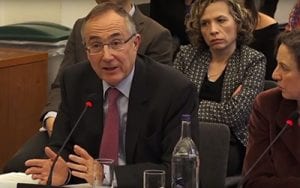On 25 January, the Education Select Committee held the second Oral Evidence Session of its inquiry on the effect of Brexit on higher education (HE) at UCL.
The committee heard evidence from UCL President & Provost Professor Michael Arthur, NUS Vice-President (Higher Education) Sorana Vieru and representatives of University and College Union, Erasmus Student Network UK, Universities UK, the British Council and London Economics.
There was a strong consensus on the potentially damaging effects of Brexit on HE, and an urgent call for the government to do more to address them.

Professor Michael Arthur
The hearing took place just over a week after Theresa May’s historic speech on the UK’s strategy for exiting the European Union, and evidence was heard in two panels.
The Chair of the Education Committee, Neil Carmichael MP, began each session by asking the panellists for their reaction to the Prime Minister’s speech.
Every one of the panellists welcomed the tone of the speech and its emphasis on a “global Britain”, but called for immediate action and more specific detail – particularly in regard to the rights of EU citizens to remain in the UK.
Referring to the Prime Minister’s expressed wish to guarantee the rights of EU citizens, Professor Arthur said: “I’d like to challenge the Prime Minister to go one step further and take the initiative to make the guarantee and challenge the rest of the EU to follow”, arguing that this would give Britain the moral high-ground and provide the negotiations a foundation of good will.
The committee heard evidence of the significant contribution of the higher education sector to the British economy, including the contributions EU staff and students make to the wider economy when they are residing here.
Dr Gavan Conlon (London Economics) also argued that, with education the UK’s fifth largest services export, the HE sector can generate revenue that could contribute to the government’s Industrial Strategy.
The panellists spoke of the positive contributions that EU staff and students make in terms of diversity and ‘soft power’, contributing to Britain’s prestigious academic profile and giving their British peers invaluable experience in international engagement, leadership and collective problem solving. “For a global Britain we need global graduates”, said Rosie Birchard (Erasmus Student Network UK).
The committee also heard evidence that currently UK HE “punches well above its weight” globally – thanks, in part, to our membership of the EU. Jo Beall (British Council) pointed to statistics showing that the UK leads the world in research quality (by field-weighted citation impact) and 1 in 10 world leaders were educated here.
(more…)
Filed under Arts and Humanities, Brain Sciences, Built Environment, Engineering, Enterprise, Global, Laws, Life Sciences, Maths and Physical Sciences, Medical Sciences, Population Health Sciences, Social & Historical Sciences, Student life
Tags: Brexit, education, education select committee, EU, EUreferendum, higher education, Parliament, research, UCL
No Comments »
 The morning began with Dr Caswell Barry welcoming everyone and giving a brief overview of the day before proceeding to introduce the first speaker of the meeting: Prof Daniel Wolpert from Columbia University, who presented his work on “Probabilistic Models of Sensorimotor Control”. Prof Wolpert shared how his lab uses machine learning and Bayes theory to investigate human movement control, how we learn to manipulate tools, and what cognitive processes underlie decision making and having a change of mind. After the engaging Q&A session came to an end, Prof Michael Häusser introduced the winners of the Jon Driver Prize, awarded to outstanding young neuroscientists from UCL for their work during their PhD. This year’s awardees were Andrea Banino, for his work on “Neuroscience and AI: modelling the brain using deep neural networks”, and Ruben Duque do Vale, for his research on “Spatial navigation during escape behaviours in mice”, who both had the chance to present their work to the audience. (more…)
The morning began with Dr Caswell Barry welcoming everyone and giving a brief overview of the day before proceeding to introduce the first speaker of the meeting: Prof Daniel Wolpert from Columbia University, who presented his work on “Probabilistic Models of Sensorimotor Control”. Prof Wolpert shared how his lab uses machine learning and Bayes theory to investigate human movement control, how we learn to manipulate tools, and what cognitive processes underlie decision making and having a change of mind. After the engaging Q&A session came to an end, Prof Michael Häusser introduced the winners of the Jon Driver Prize, awarded to outstanding young neuroscientists from UCL for their work during their PhD. This year’s awardees were Andrea Banino, for his work on “Neuroscience and AI: modelling the brain using deep neural networks”, and Ruben Duque do Vale, for his research on “Spatial navigation during escape behaviours in mice”, who both had the chance to present their work to the audience. (more…) Close
Close


 Professor Ray Dolan, awardee of the 2017 Brain Prize, introduced the winners of the
Professor Ray Dolan, awardee of the 2017 Brain Prize, introduced the winners of the 
